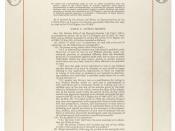There are two distinct court systems in the United States, the state court system and the federal court system. Each state has a legislative and court system to set rules and determine resolutions to dispute. The laws and decisions of those states apply specifically to that state only. The federal system however has jurisdiction to make law and find resolution across all states.
The U.S. Equal Employment Opportunity Commission (EEOC) enforces laws enacted to prevent job discrimination. They are also involved in oversight and policy making as it is related to job discriminations. Any individual who feels their employer has discriminated against them for any of the reasons overseen by the EEOC has the right to file a complaint.
One of the largest pieces of legislation overseen by the EEOC is Title VII of the Civil Rights Act of 1964 (www.eeoc.gov). Title VII was enacted to ensure fair employment practices would be followed and that those practices would be free from discrimination in the areas of race, color, religion, sex, or national origin.
The Civil Rights Act of 1991 added the additional benefit of allowing the violated party to attempt recovery of compensatory and punitive damages for willful and intentional violation of Title VII.
As with any government process, the steps to successfully making a claim of job discrimination are precise. Failure to follow them exactly could result in even the most valid claim being denied. Any individual who believes their employment rights have been violated can file a claim with the EEOC. Files can be claimed on behalf of the individual by another individual, organization, or agency if it is necessary to protect the identity of the first individual.
After completing the complaint process through the EEOC the individual still has the right to pursue compensation through civil litigation...


